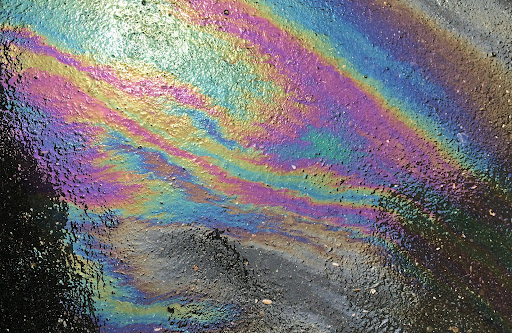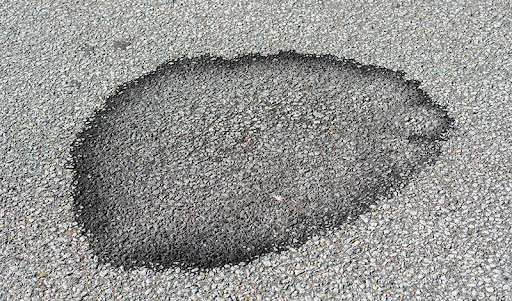
There is nothing more frustrating than cleaning stubborn oil spots on asphalt surfaces. If you leave oil spots to fester, though, they can give rise to several unfavorable consequences. As such, when you see oil spots, it’s best to address them immediately.
Have you ever wondered how oil spots end up on your asphalt driveway or parking lot? You might be walking up to your home or commercial property one day, minding your own business, when you suddenly notice that unmistakable stain. How did that even get there in the first place?
Oil spots can have several possible causes. The most common one is motor oil. When vehicles drive or park in the same spot, motor oil can leak from the car to the ground.
However, oil or gasoline can also come from other sources. These include lawnmowers and snow blowers. The oil can stain the ground if you refill the gas tank or maintain your equipment on an asphalt surface.
Motor oil and gasoline aren’t the only staining agents, though. You may also get oil spots if you cook on the pavement. Cooking sprays and grease pans from barbecues are the usual culprits. And, while rare, oil spills on the road can also leave ugly stains. Any type of oil can result in spots.
Oil stains not only affect the appearance of your pavement but can also have lasting negative effects. What happens if you spill oil on asphalt?
Oil can interact with the asphalt binder, which holds the asphalt together. Both oil and asphalt binders come from petroleum, so they have chemical similarities. In fact, asphalt binder also contains some amount of oil. When oil penetrates the pavement, it changes the chemical composition of the asphalt binder.
Given enough time, oil can damage asphalt. The chemical effect of the oil on the asphalt makes the asphalt much softer and more vulnerable to damage. The asphalt surface will then deteriorate at a much quicker rate than normal.
Oil-soaked asphalt is also more prone to moisture. This allows water to penetrate the surface and erode the underlying base easily. Before long, cracks and holes will start to form.
Oil slicks on the road can result in terrible traffic accidents. Oil can make roads slippery, causing collisions. Drivers can lose control of their vehicles and ram into stationary structures, other vehicles, and even pedestrians.
While concrete is durable, it’s not immune to all substances. Over time, oil can cause concrete damage because it can destabilize the concrete matrix.

Is it an oil stain or just a wet spot? This is a question a lot of people might ask. If you want to learn how to identify oil spots on asphalt driveways or pavements, here are a few signs to watch out for.
If you can’t clean the spot with water, even with a pressure washer, it’s most likely an oil stain. Water alone doesn’t work on oil spots.
Engine oil tends to create a series of spots and leaves a dark brown or black stain. Fresh engine oil also tends to be sticky.
Oil stains give off a greasy smell.
Some types of oil depict a rainbow pattern when viewed from a certain angle.
For fresh oil spills, take a paper towel and gently dab the surface with it. You should be able to tell if it’s oil when you turn it over.
Unlike dirt and debris, oil spots are not easy to clean. You can’t just wash it away with water or wipe it off with a towel. A mild household detergent may work on smaller stains, but larger or deeper stains tend to require stronger cleaning solutions.
Here’s how to get rid of oil stains on an asphalt driveway.
First, remove any excess or loose oil that has yet to seep into the pavement.
Then, using a hard-bristled brush or broom, scrub the oil-stained area with a mixture of water and baking soda. Alternatively, you can use powdered laundry detergent.
Let the solution sit for 30 minutes (or follow the manufacturer’s instructions).
Rinse off with warm water.
Repeat as necessary.
Cleaning is not enough if the oil spot has already penetrated the asphalt and softened it. You can tell asphalt has softened when you can scoop some of it away using a screwdriver or even the tip of your finger. A weakened asphalt can lead to a host of other problems. In this case, it’s best to contact a professional to remove the oil stain and repair the asphalt surface.
There are some household items you can use to clean oil spots. Here are some of the products you can try when getting oil stains off asphalt driveways.
Soapy water. Use a mixture of soap and water to clean fresh oil off the ground.
Baking soda. You can cover the oil-stained area with baking soda and scrub it with a hard-bristled brush before rinsing it with water. Alternatively, you can mix baking soda and water to form a paste.
Kitty litter. Cat litter works best on fresh oil spills. Cover the stained area with kitty litter and allow it to sit overnight to absorb the oil.
Laundry detergent. Scrub the oil-stained area with powdered laundry detergent before rinsing with hot water.
Cola. Pour cola over the affected area and leave for at least 24 hours to soak. Rinse it off with water afterward.
Degreaser. If you need a stronger product, use a degreaser to remove oil spots on asphalt surfaces. Make sure to follow the instructions of the manufacturer for the best results.
When faced with an oil stain, it’s important to act fast. That’s the best thing you can do. Acting fast prevents the oil from staining the asphalt permanently and causing damage.
Unfortunately, this isn’t always possible. In that case, you can get rid of oil spots on asphalt using everything from household items to commercial degreasers. In more severe cases, you will need the help of a professional.
RELATED ARTICLES: